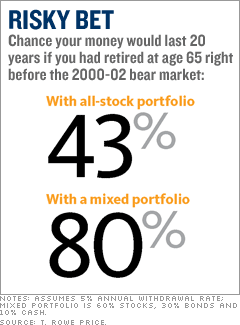It's comforting to look at historical returns. Despite the occasional setback, the market continues to rise over the long run. In any 10-year period since 1926, you'd have made money in stocks 97% of the time; over 20 years you'd be ahead 100% of the time.
As long as you're patient and keep investing, you'll do well, right?
Not necessarily. When you're far from retirement, you can tough out even devastating bear markets, buying low while you do. Once you near your quit date, the rules change. Say you were within a few years of retirement in January 2000, on the eve of the March 2000 to October 2002 meltdown, when stocks plunged 44%.
If you were solely in stocks, it would have taken you 41/2 years just to break even. But if you'd had 60% of your portfolio in stocks, 30% in bonds and 10% in cash, you'd have had far milder losses of 21%. Once you start cashing out, a bear market of that magnitude can seriously jeopardize your standard of living. If youwere a retiree with that same all-stock portfolio in the 2000-02 bear market, those losses would mean you'd have only a 43% chance of seeing your money last until age 85 vs. 80% if you had a more conservative allocation.

